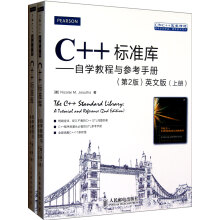C++标准库:自学教程与参考手册·英文版(套装上下册)(第2版)

1 About This Book 1.1 WhyThisBook 1.2 Before Reading This Book 1.3 Style and Structure of the Book 1.4 HowtoReadThisBook 1.5 Stateof theArt 1.6 Example Code and Additional Information 1.7 Feedback 2 Introduction to C++ and the Standard Library 2.1 History of theC++Standards 2.1.1 Common Questions about the C++11 Standard 2.1.2 Compatibility between C++98 and C++11 2.2 Complexity and Big-O Notation 3 New Language Features 3.1 New C++11 Language Features 3.1.1 Important Minor Syntax Cleanups 3.1.2 Automatic Type Deduction with auto 3.1.3 Uniform Initialization and Initializer Lists 3.1.4 Range-Based for Loops 3.1.5 Move Semantics and Rvalue References 3.1.6 NewStringLiterals 3.1.7 Keyword noexcept 3.1.8 Keyword constexpr 3.1.9 NewTemplateFeatures 3.1.10 Lambdas 3.1.11 Keyword decltype 3.1.12 New Function Declaration Syntax 3.1.13 Scoped Enumerations 3.1.14 New Fundamental Data Types 3.2 Old “New” Language Features 3.2.1 Explicit Initialization for Fundamental Types 3.2.2 Definition of main() 4 General Concepts 4.1 Namespace std 4.2 HeaderFiles 4.3 Error and Exception Handling 4.3.1 Standard Exception Classes 4.3.2 Members of Exception Classes 4.3.3 Passing Exceptions with Class exception_ptr 4.3.4 Throwing Standard Exceptions 4.3.5 Deriving from Standard Exception Classes 4.4 CallableObjects 4.5 Concurrency and Multithreading 4.6 Allocators 5 Utilities 5.1 Pairs and Tuples 5.1.1 Pairs 5.1.2 Tuples 5.1.3 I\/O for Tuples 5.1.4 Conversions between tuples and pairs 5.2 Smart Pointers 5.2.1 Class shared_ptr 5.2.2 Class weak_ptr 5.2.3 Misusing Shared Pointers 5.2.4 Shared and Weak Pointers in Detail 5.2.5 Class unique_ptr 5.2.6 Class unique_ptr inDetail 5.2.7 Class auto_ptr 5.2.8 Final Words on Smart Pointers 5.3 NumericLimits 5.4 Type Traits and Type Utilities 5.4.1 PurposeofTypeTraits 5.4.2 TypeTraits inDetail 5.4.3 ReferenceWrappers 5.4.4 Function Type Wrappers 5.5 Auxiliary Functions 5.5.1 Processing the Minimum and Maximum 5.5.2 Swapping Two Values 5.5.3 Supplementary Comparison Operators 5.6 Compile-Time Fractional Arithmetic with Class ratio 5.7 Clocks andTimers 5.7.1 Overviewof theChronoLibrary 5.7.2 Durations 5.7.3 Clocks and Timepoints 5.7.4 Date and Time Functions by C and POSIX 5.7.5 Blocking with Timers 5.8 Header Files , , and 5.8.1 Definitions in 5.8.2 Definitions in 5.8.3 Definitions in 6 The Standard Template Library 6.1 STL Components 6.2 Containers 6.2.1 Sequence Containers 6.2.2 Associative Containers 6.2.3 Unordered Containers 6.2.4 AssociativeArrays 6.2.5 Other Containers 6.2.6 Container Adapters 6.3 Iterators 6.3.1 Further Examples of Using Associative and Unordered Containers 6.3.2 IteratorCategories 6.4 Algorithms 6.4.1 Ranges 6.4.2 Handling Multiple Ranges 6.5 IteratorAdapters 6.5.1 Insert Iterators 6.5.2 StreamIterators 6.5.3 Reverse Iterators 6.5.4 Move Iterators 6.6 User-Defined Generic Functions 6.7 Manipulating Algorithms 6.7.1 “Removing” Elements 6.7.2 Manipulating Associative and Unordered Containers 6.7.3 Algorithms versus Member Functions 6.8 Functions as Algorithm Arguments 6.8.1 Using Functions as Algorithm Arguments 6.8.2 Predicates 6.9 UsingLambdas 6.10 Function Objects 6.10.1 Definition of Function Objects 6.10.2 Predefined Function Objects 6.10.3 Binders 6.10.4 Function Objects and Binders versus Lambdas 6.11 Container Elements 6.11.1 Requirements for Container Elements 6.11.2 Value Semantics or Reference Semantics 6.12 Errors and Exceptions inside the STL 6.12.1 Error Handling 6.12.2 Exception Handling 6.13 Extending the STL 6.13.1 Integrating Additional Types 6.13.2 Deriving from STL Types 7 STL Containers 7.1 Common Container Abilities and Operations 7.1.1 Container Abilities 7.1.2 Container Operations 7.1.3 Container Types 7.2 Arrays 7.2.1 Abilities of Arrays 7.2.2 Array Operations 7.2.3 Using arrays as C-Style Arrays 7.2.4 Exception Handling 7.2.5 Tuple Interface 7.2.6 ExamplesofUsingArrays 7.3 Vectors 7.3.1 Abilities of Vectors 7.3.2 Vector Operations 7.3.3 Using Vectors as C-Style Arrays 7.3.4 Exception Handling 7.3.5 ExamplesofUsingVectors 7.3.6 Class vector 7.4 Deques 7.4.1 Abilities of Deques 7.4.2 Deque Operations 7.4.3 Exception Handling 7.4.4 ExamplesofUsingDeques 7.5 Lists 7.5.1 Abilities of Lists 7.5.2 List Operations 7.5.3 Exception Handling 7.5.4 ExamplesofUsingLists 7.6 ForwardLists 7.6.1 Abilities of Forward Lists 7.6.2 Forward List Operations 7.6.3 Exception Handling 7.6.4 ExamplesofUsingForwardLists 7.7 Sets and Multisets 7.7.1 Abilities of Sets and Multisets 7.7.2 Set and Multiset Operations 7.7.3 Exception Handling 7.7.4 Examples of Using Sets and Multisets 7.7.5 Example of Specifying the Sorting Criterion at Runtime 7.8 Maps and Multimaps 7.8.1 Abilities of Maps and Multimaps 7.8.2 Map and Multimap Operations 7.8.3 UsingMaps asAssociativeArrays 7.8.4 Exception Handling 7.8.5 Examples of Using Maps and Multimaps 7.8.6 Example with Maps, Strings, and Sorting Criterion at Runtime 7.9 Unordered Containers 7.9.1 Abilities of Unordered Containers 7.9.2 Creating and Controlling Unordered Containers 7.9.3 Other Operations for Unordered Containers 7.9.4 TheBucket Interface 7.9.5 UsingUnorderedMaps asAssociativeArrays 7.9.6 Exception Handling 7.9.7 Examples of Using Unordered Containers 7.10 Other STL Containers 7.10.1 Strings as STL Containers 7.10.2 Ordinary C-Style Arrays as STL Containers 7.11 Implementing Reference Semantics 7.12 When to Use Which Container 8 STL Container Members in Detail 8.1 Type Definitions 8.2 Create, Copy, and Destroy Operations 8.3 Nonmodifying Operations 8.3.1 Size Operations 8.3.2 Comparison Operations 8.3.3 Nonmodifying Operations for Associative and Unordered Containers 8.4 Assignments 8.5 Direct Element Access 8.6 Operations to Generate Iterators 8.7 Inserting and Removing Elements 8.7.1 Inserting Single Elements 8.7.2 Inserting Multiple Elements 8.7.3 Removing Elements 8.7.4 Resizing 8.8 Special Member Functions for Lists and Forward Lists 8.8.1 Special Member Functions for Lists (and Forward Lists) 8.8.2 Special Member Functions for Forward Lists Only 8.9 Container Policy Interfaces 8.9.1 Nonmodifying Policy Functions 8.9.2 Modifying Policy Functions 8.9.3 Bucket Interface for Unordered Containers 8.10 Allocator Support 8.10.1 Fundamental Allocator Members 8.10.2 Constructors with Optional Allocator Parameters 9 STL Iterators 9.1 HeaderFiles for Iterators 9.2 IteratorCategories 9.2.1 Output Iterators 9.2.2 Input Iterators 9.2.3 ForwardIterators 9.2.4 Bidirectional Iterators 9.2.5 Random-Access Iterators 9.2.6 The Increment and Decrement Problem of Vector Iterators 9.3 Auxiliary Iterator Functions 9.3.1 advance() 9.3.2 next() and prev() 9.3.3 distance() 9.3.4 iter_swap() 9.4 IteratorAdapters 9.4.1 Reverse Iterators 9.4.2 Insert Iterators 9.4.3 StreamIterators 9.4.4 Move Iterators 9.5 IteratorTraits 9.5.1 Writing Generic Functions for Iterators 9.6 Writing User-Defined Iterators 10 STL Function Objects and Using Lambdas 10.1 The Concept of Function Objects 10.1.1 Function Objects as Sorting Criteria 10.1.2 Function Objects with Internal State 10.1.3 The Return Value of for_each() 10.1.4 Predicates versus Function Objects 10.2 Predefined Function Objects and Binders 10.2.1 Predefined Function Objects 10.2.2 Function Adapters and Binders 10.2.3 User-Defined Function Objects for Function Adapters 10.2.4 Deprecated Function Adapters 10.3 UsingLambdas 10.3.1 Lambdas versus Binders 10.3.2 Lambdas versus Stateful Function Objects 10.3.3 Lambdas Calling Global and Member Functions 10.3.4 Lambdas as Hash Function, Sorting, or Equivalence Criterion 11 STL Algorithms 11.1 Algorithm Header Files 11.2 Algorithm Overview 11.2.1 A Brief Introduction 11.2.2 Classification of Algorithms 11.3 Auxiliary Functions 11.4 The for_each() Algorithm 11.5 Nonmodifying Algorithms 11.5.1 Counting Elements 11.5.2 Minimum and Maximum 11.5.3 Searching Elements 11.5.4 ComparingRanges 11.5.5 Predicates forRanges 11.6 Modifying Algorithms 11.6.1 Copying Elements 11.6.2 Moving Elements 11.6.3 Transforming and Combining Elements 11.6.4 Swapping Elements 11.6.5 Assigning New Values 11.6.6 ReplacingElements 11.7 Removing Algorithms 11.7.1 Removing Certain Values 11.7.2 Removing Duplicates 11.8 Mutating Algorithms 11.8.1 ReversingtheOrderofElements 11.8.2 Rotating Elements 11.8.3 Permuting Elements 11.8.4 ShufflingElements 11.8.5 Moving Elements to the Front 11.8.6 Partition into Two Subranges 11.9 Sorting Algorithms 11.9.1 Sorting All Elements 11.9.2 Partial Sorting 11.9.3 Sorting According to the nthElement 11.9.4 Heap Algorithms 11.10 Sorted-Range Algorithms 11.10.1 Searching Elements 11.10.2 Merging Elements 11.11 Numeric Algorithms 11.11.1 Processing Results 11.11.2 Converting Relative and Absolute Values 12 Special Containers 12.1 Stacks 12.1.1 TheCore Interface 12.1.2 ExampleofUsingStacks 12.1.3 AUser-DefinedStackClass 12.1.4 Class stack inDetail 12.2 Queues 12.2.1 TheCore Interface 12.2.2 ExampleofUsingQueues 12.2.3 AUser-DefinedQueueClass 12.2.4 Class queue inDetail 12.3 PriorityQueues 12.3.1 TheCore Interface 12.3.2 ExampleofUsingPriorityQueues 12.3.3 Class priority_queue inDetail 12.4 Container Adapters in Detail 12.4.1 Type Definitions 12.4.2 Constructors 12.4.3 Supplementary Constructors for Priority Queues 12.4.4 Operations 12.5 Bitsets 12.5.1 ExamplesofUsingBitsets 12.5.2 Class bitset inDetail 13 Strings 13.1 Purposeof theStringClasses 13.1.1 A First Example: Extracting a Temporary Filename 13.1.2 A Second Example: Extracting Words and Printing Them Backward 13.2 Description of the String Classes 13.2.1 StringTypes 13.2.2 Operation Overview 13.2.3 Constructors andDestructor 13.2.4 Strings and C-Strings 13.2.5 Size andCapacity 13.2.6 Element Access 13.2.7 Comparisons 13.2.8 Modifiers 13.2.9 Substrings and String Concatenation 13.2.10 Input\/Output Operators 13.2.11 Searching and Finding 13.2.12 The Value npos 13.2.13 Numeric Conversions 13.2.14 Iterator Support for Strings 13.2.15 Internationalization 13.2.16 Performance 13.2.17 Strings and Vectors 13.3 StringClass inDetail 13.3.1 Type Definitions and Static Values 13.3.2 Create, Copy, and Destroy Operations 13.3.3 Operations for Size and Capacity 13.3.4 Comparisons 13.3.5 Character Access 13.3.6 Generating C-Strings and Character Arrays 13.3.7 Modifying Operations 13.3.8 Searching and Finding 13.3.9 Substrings and String Concatenation 13.3.10 Input\/Output Functions 13.3.11 Numeric Conversions 13.3.12 Generating Iterators 13.3.13 Allocator Support 14 Regular Expressions 14.1 TheRegexMatch andSearchInterface 14.2 Dealing with Subexpressions 14.3 Regex Iterators 14.4 RegexToken Iterators 14.5 Replacing Regular Expressions 14.6 RegexFlags 14.7 Regex Exceptions 14.8 TheRegexECMAScriptGrammar 14.9 OtherGrammars 14.10 Basic Regex Signatures in Detail 15 Input\/Output Using Stream Classes 15.1 Common Background of I\/O Streams 15.1.1 StreamObjects 15.1.2 StreamClasses 15.1.3 Global Stream Objects 15.1.4 StreamOperators 15.1.5 Manipulators 15.1.6 ASimpleExample 15.2 Fundamental Stream Classes and Objects 15.2.1 Classes andClassHierarchy 15.2.2 Global Stream Objects 15.2.3 HeaderFiles 15.3 Standard Stream Operators 15.3.1 Output Operator 15.3.3 Input\/Output of Special Types 15.4 StateofStreams 15.4.1 Constants for theStateofStreams 15.4.2 Member Functions Accessing the State of Streams 15.4.3 Stream State and Boolean Conditions 15.4.4 Stream State and Exceptions 15.5 Standard Input\/Output Functions 15.5.1 Member Functions for Input 15.5.2 Member Functions for Output 15.5.3 ExampleUses 15.5.4 sentryObjects 15.6 Manipulators 15.6.1 Overview of All Manipulators 15.6.2 How Manipulators Work 15.6.3 User-Defined Manipulators 15.7 Formatting 15.7.1 FormatFlags 15.7.2 Input\/Output Format of Boolean Values 15.7.3 Field Width, Fill Character, and Adjustment 15.7.4 PositiveSignandUppercaseLetters 15.7.5 NumericBase 15.7.6 Floating-Point Notation 15.7.7 General Formatting Definitions 15.8 Internationalization 15.9 File Access 15.9.1 FileStreamClasses 15.9.2 Rvalue and Move Semantics for File Streams 15.9.3 FileFlags 15.9.4 Random Access 15.9.5 Using File Descriptors 15.10 Stream Classes for Strings 15.10.1 StringStreamClasses 15.10.2 Move Semantics for String Streams 15.10.3 char*StreamClasses 15.11 Input\/Output Operators for User-Defined Types 15.11.1 Implementing Output Operators 15.11.2 Implementing Input Operators 15.11.3 Input\/Output Using Auxiliary Functions 15.11.4 User-DefinedFormatFlags 15.11.5 Conventions for User-Defined Input\/Output Operators 15.12 Connecting Input and Output Streams 15.12.1 Loose Coupling Using tie() 15.12.2 Tight Coupling Using Stream Buffers 15.12.3 Redirecting Standard Streams 15.12.4 Streams for Reading and Writing 15.13 TheStreamBufferClasses 15.13.1 The Stream Buffer Interfaces 15.13.2 StreamBuffer Iterators 15.13.3 User-DefinedStreamBuffers 15.14 Performance Issues 15.14.1 Synchronization with C’s Standard Streams 15.14.2 BufferinginStreamBuffers 15.14.3 UsingStreamBuffersDirectly 16 Internationalization 16.1 Character Encodings and Character Sets 16.1.1 Multibyte and Wide-Character Text 16.1.2 DifferentCharacterSets 16.1.3 Dealing with Character Sets in C++ 16.1.4 CharacterTraits 16.1.5 Internationalization of Special Characters 16.2 TheConceptofLocales 16.2.1 UsingLocales 16.2.2 Locale Facets 16.3 Locales inDetail 16.4 Facets in Detail 16.4.1 Numeric Formatting 16.4.2 Monetary Formatting 16.4.3 Time and Date Formatting 16.4.4 Character Classification and Conversion 16.4.5 String Collation 16.4.6 Internationalized Messages 17 Numerics 17.1 Random Numbers and Distributions 17.1.1 AFirstExample 17.1.2 Engines 17.1.3 Engines in Detail 17.1.4 Distributions 17.1.5 Distributions in Detail 17.2 ComplexNumbers 17.2.1 Class complex inGeneral 17.2.2 Examples Using Class complex 17.2.3 Operations for Complex Numbers 17.2.4 Class complex inDetail 17.3 Global Numeric Functions 17.4 Valarrays 18 Concurrency 18.1 The High-Level Interface: async() and Futures 18.1.1 A First Example Using async() and Futures 18.1.2 An Example of Waiting for Two Tasks 18.1.3 Shared Futures 18.2 The Low-Level Interface: Threads and Promises 18.2.1 Class std::thread 18.2.2 Promises 18.2.3 Class packaged_task 18.3 Starting a Thread in Detail 18.3.1 async() inDetail 18.3.2 Futures in Detail 18.3.3 Shared Futures in Detail 18.3.4 Class std::promise inDetail 18.3.5 Class std::packaged_task inDetail 18.3.6 Class std::thread inDetail 18.3.7 Namespace this_thread 18.4 Synchronizing Threads, or the Problem of Concurrency 18.4.1 BewareofConcurrency! 18.4.2 The Reason for the Problem of Concurrent Data Access 18.4.3 What Exactly Can Go Wrong (the Extent of the Problem) 18.4.4 The Features to Solve the Problems 18.5 Mutexes andLocks 18.5.1 UsingMutexes andLocks 18.5.2 Mutexes andLocks inDetail 18.5.3 Calling Once for Multiple Threads 18.6 Condition Variables 18.6.1 Purpose of Condition Variables 18.6.2 A First Complete Example for Condition Variables 18.6.3 Using Condition Variables to Implement a Queue for Multiple Threads 18.6.4 Condition Variables in Detail 18.7 Atomics 18.7.1 ExampleofUsingAtomics 18.7.2 Atomics and Their High-Level Interface in Detail 18.7.3 The C-Style Interface of Atomics 18.7.4 TheLow-Level InterfaceofAtomics 19 Allocators 19.1 Using Allocators as an Application Programmer 19.2 AUser-DefinedAllocator 19.3 UsingAllocators as aLibraryProgrammer Bibliography Newsgroups and Forums Books and Web Sites Index
NiColai M. Josuttis是一名独立的技术顾问,曾经为电信、交通、金融和制造行业设计过大中型软件系统。他还是C++标准委员会工作组的前成员,并因为编写了权威的C++图书而被人众所周知。除了1999年出版的本书第1版(享誉全球的C++畅销图书)之外,他还是C++ Templates: The Complete Guide (Addison-Wesley, 2003)和SOA in Practice: The Art of Distributed System Design (O’Reilly Media, 2007)的作者。
《C++标准库:自学教程与参考手册(第2版)(英文版)(套装上下册)》第1版自1999年出版便成为全球畅销书,经久不衰。它提供了一组通用类和接口,极大地拓展了C++核心语言。本书在第1版的基础上,为每个库组件都提供详细全面的文档,介绍各组件的用途和设计,清晰地解释复杂的内容;阐述了高效使用所需要的实践编程细节、陷阱和缺陷、大部分重要类和函数的精确签名(signature)以及定义,而且包含丰富代码示例。本书将重点放在标准模版库(STL)上,检查其中的容器(container)、迭代器(iterator)、函数对象(function object)和STL算法。
《C++标准库:自学教程与参考手册(第2版)(英文版)(套装上下册)》涵盖了所有的新的C++11库组件,包括:并发性、分数计算、时钟和计时器、元组、新STL容器、新STL算法、新智能指针、新local方面、随机数字和分布、类型特性和通用工具、正则表达式。除此之外,本书还解释了新的C++编程样式以及对标准库的影响,包括lambda、基于范围的for循环、移动语义和可变参数模版。
本书的读者需要对类、继承、模版、异常处理和名称空间的概念有所了解(本书介绍标准组件,而非语言本身),但也不必掌握所有的语言细节。书中见解深刻的基础概念介绍和标准库鸟瞰,可助读者快速提升。本书可兼作自修教程和标准库参考手册,不仅可用作C++高级教材,也是软件从业人员不可或缺的案头参考书。
《C++标准库:自学教程与参考手册(第2版)(英文版)(套装上下册)》涵盖了所有的新的C++11库组件,包括:并发性、分数计算、时钟和计时器、元组、新STL容器、新STL算法、新智能指针、新local方面、随机数字和分布、类型特性和通用工具、正则表达式。除此之外,本书还解释了新的C++编程样式以及对标准库的影响,包括lambda、基于范围的for循环、移动语义和可变参数模版。
本书的读者需要对类、继承、模版、异常处理和名称空间的概念有所了解(本书介绍标准组件,而非语言本身),但也不必掌握所有的语言细节。书中见解深刻的基础概念介绍和标准库鸟瞰,可助读者快速提升。本书可兼作自修教程和标准库参考手册,不仅可用作C++高级教材,也是软件从业人员不可或缺的案头参考书。
比价列表
1人想要1人拥有
公众号、微信群
 缺书网
缺书网微信公众号
 扫码进群
扫码进群实时获取购书优惠







